Racing to Zero Report
Business attitudes towards sustainability in 2021
As the planet continues to heat up and net zero deadlines creep ever closer, businesses are being urged to step up and tackle their carbon footprints. But where does environmental sustainability lie among business priorities in the wake of the COVID-19 pandemic? To find out, we went and asked businesses about their thoughts,
Here is a summary of what we found.

Business priorities have shifted
When we first talked to businesses in 2019, the results of which are contained in our report, Reduce, re-use, recycle, environmental sustainability was sitting high in their consciousness thanks to the ‘Blue Planet’ effect and the powerful speeches of Greta Thunberg. As a result, environmental sustainability came out as the second-most important priority to businesses.
In 2021, things have changed. Thanks to the pandemic, businesses appear to have reprioritised their top objectives. Indeed, only 1.8% of our respondents ranked environmental sustainability as their number one priority, and just 11% put it in second place. Leading the list of business concerns was the health & safety of workers, an unsurprising result given the new hyper-awareness of hygiene due to COVID-secure measures.
What is surprising, however, is that COVID recovery was not highly ranked. Indeed, just 3.7% of our respondents listed it as their top priority.
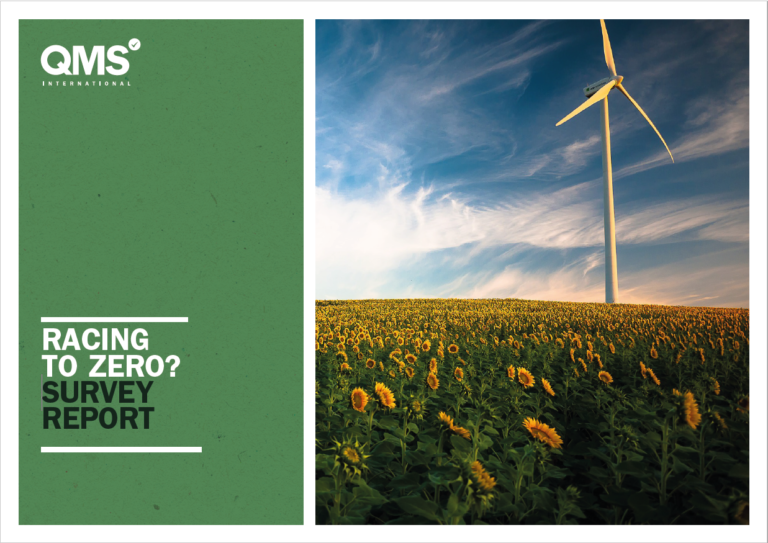
Reducing environmental impact
When it comes to action, recycling remains a popular move. In our latest study, 78.2% of our survey participants currently support and promote recycling efforts, perhaps one of the easiest and cheapest changes to make in a nod towards sustainability.
It is also encouraging that 37.3% of our respondents are also focused on waste, which can massively bump up a business’ carbon footprint. If businesses are focused on trying to recycle more of their waste or find ways to reduce it in the first place, then they can benefit from not only a shrunken footprint but potential cost savings from greater efficiency.
The report also highlights some drops in the popularity of other actions. Just 22.7% said that they would consider sustainable building in our latest survey, a significant drop from the 41% of respondents who said the same back in 2019. The use of renewable energy has also fallen in terms of popularity with only 21.8% carrying this action out, a notable drop from the 37% of participants in our previous research.
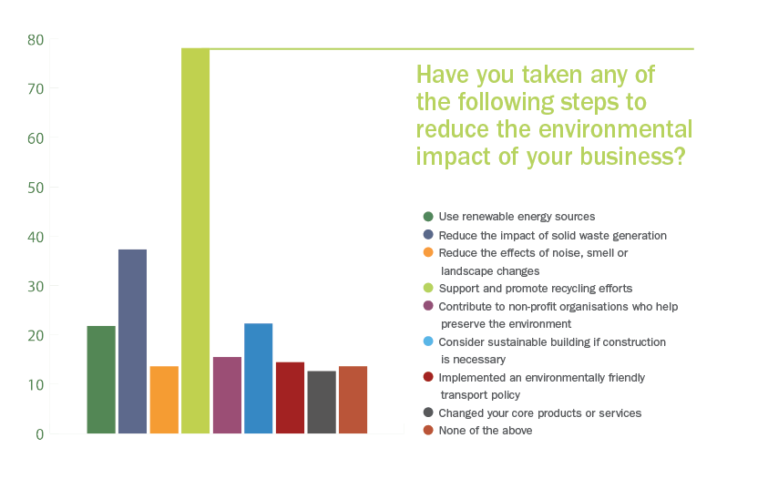
Changes triggered by COVID-19
The falls we can see in some types of sustainable action could be linked to the pandemic. Sustainable building requires investment and planning, which was probably more difficult during the crisis. The switch to more remote working could also mean that fewer businesses feel the need to expand their premises, so sustainable building is no longer part of the equation.
The effects of the pandemic could also explain why renewable energy hasn’t been considered by as many respondents. With fewer people in the workplace and periods of disrupted work, it is possible that many businesses have not been using as much energy and therefore haven’t been looking into alternatives.
This could also explain why minor measures, such as a paperless policy, have gained in popularity. In 2021, 55.6% of businesses reported that they had implemented this policy, compared with 31% in 2019. This may have been made easier by a reduced office presence, which has kept workers away from printing facilities and may have helped to break the habit of relying on printouts.

Blocks and barriers to change
Change isn’t easy, and businesses have a myriad of real and perceived barriers to change when it comes to sustainability.
Our research highlights that one of the biggest perceived barriers is the requirements of customers, which was flagged up by 50.9% of respondents. This is an interesting finding as it implies that the customers themselves are not interested in the sustainability of the products and services that they use, which our research suggests is certainly not the case.
Other very real barriers affect SMEs, which often don’t have full agency over their workplace. In these cases, reducing their environmental impact is more complex and can certainly limit their actions to more minor changes. It is therefore unsurprising that 31.8% of our respondents said that their work within customer spaces restricted their actions while another 15.5% pointed out that they work within shared areas.
Finance, of course, also remains as a major barrier, with 41.8% of respondents reporting this.
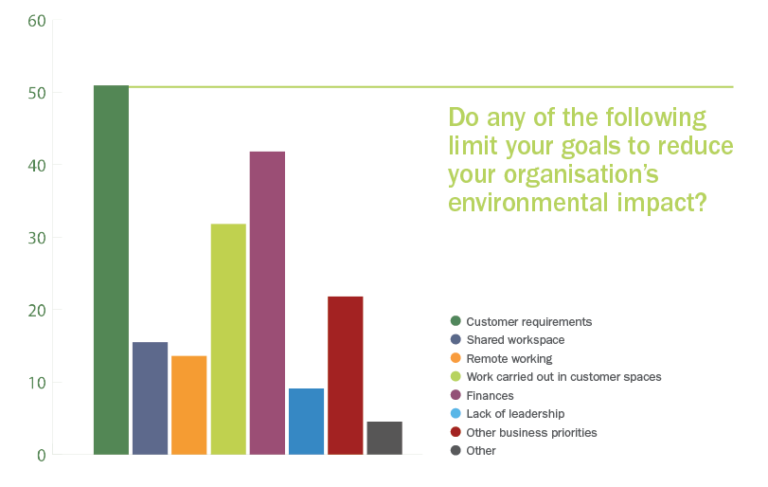
Ambitions for carbon neutrality
If we are to achieve net zero, some companies are going to need to strive for carbon neutrality. But this is easier said than done.
It is therefore encouraging that just over a quarter of our respondents (26%) have said that they plan to make this aspiration a reality.
What could be helping to drive this ambition is the desire of customers. Although customer requirements were highlighted as a barrier to change, our respondents also reported that their customers’ awareness of sustainability was on the increase. When asked about their customers’ attitudes, 22% said that their green credentials were ‘very important’ to their clients, while 47% said that they were ‘quite important’. If customers want change, it is very likely that businesses will adapt in order to meet their new needs, spurring a move towards greater sustainability.
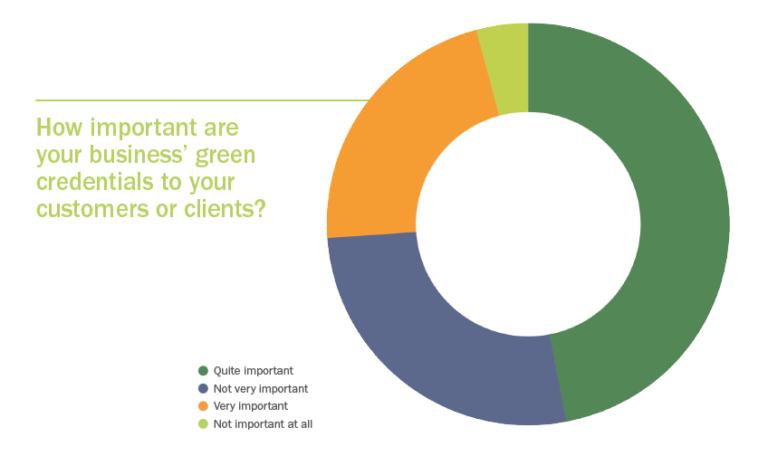
Managing environmental change
Our report also looks at the role of environmental management systems, such as ISO 14001, in business’ sustainable action plans.
Environmental management systems are designed to help organisations implement best-practice when it comes to managing and controlling environmental impact, helping them to identify efficiencies and different ways of working. Of our respondents, 47% already have a system in place.
The most popular reason for doing this was to improve a business’ image and reputation (38.2%). This was followed by the more altruistic desires to prevent or control pollution and limit climate change (both 27.3%). These were joined by the fact that these systems can also open up more business opportunities (also 27.3%).
When it comes to those who haven’t yet implemented a system, there is a diverse list of reasons for why.
This included their business not needing one (18%), the business already doing enough (8.1%) and not knowing enough about an environmental management system (7.2%). These responses suggest that there is still a lack of knowledge when it comes to systems such as ISO 14001 and that there needs to be better communication of its benefits and how it can help organisations of all sizes to continue to drive long-term improvement.
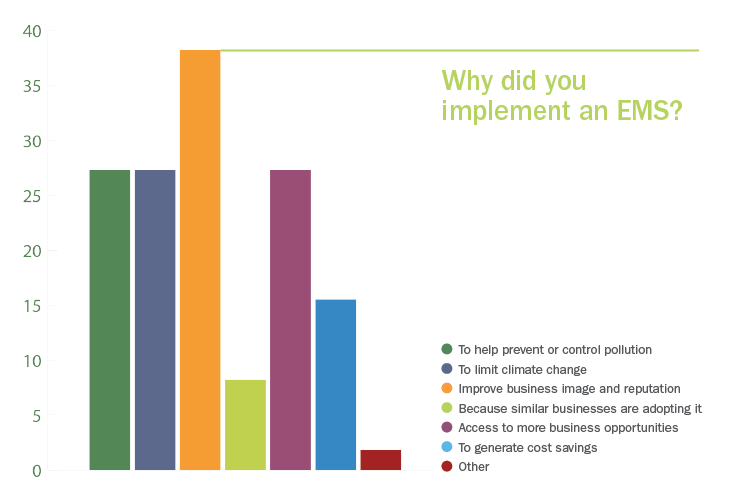
Time to join the race
Our report reveals a fairly positive picture when it comes to business attitudes towards the environment and sustainability.
Generally, businesses acknowledge the impact their operations have upon the environment, and they agree that tackling this is important. Positive steps have already been taken, with recycling being widespread, for example.
However, business priorities going forward may need to be reassessed.
Longer-term strategies still need to be put in place. Companies must also keep a close eye on their customers’ needs and expectations, which could change as sustainability grows as an issue.
Finally, businesses are perhaps still a little in the dark when it comes to the benefits of environmental management systems such as ISO 14001. Communication here is key, as they can help businesses to impose the framework they need to drive sustainability forward.
If you want to find out more about ISO 14001 and what we can do to help your business achieve it, head over to our dedicated webpage or get a free quote with our calculator.

